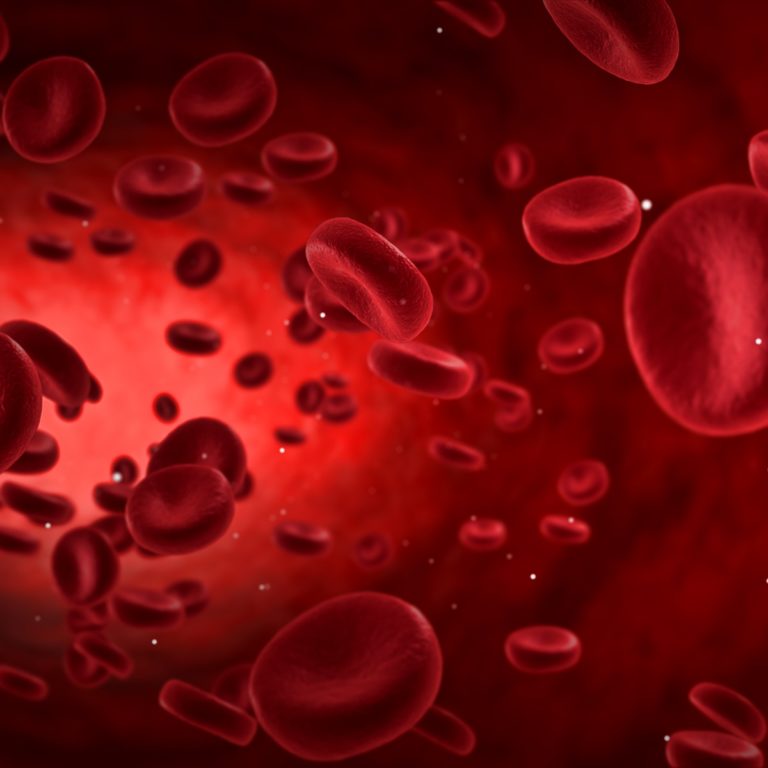Eye health is an essential part of your overall health and is very important in everyday life. You can sense the surrounding world using your eyesight. We see and perceive others with eyes, and others see and perceive us with eyes – as we know, eyes are the windows to our soul. They may be empty and lifeless as if no one was home – or clear, radiant, and full of life.
They can reflect anger and fear or care, trust, and curiosity. We see not only physically, but also psychologically and emotionally. To see is to perceive, to feel, to understand, to know.
Images generated by nerve impulses are sent from the retina to the brain, which means that clear vision does not depend on eyes as much as on a well-functioning nervous system. If we do not like what we see, we can close our eyes and refuse to look.
The worsening of vision is often caused by genetic and environmental factors or disease (diabetes). However, it may also be a psychological and emotional level related problem – the desire to cut oneself off from what is seen.
Eye Health From a Holistic Perspective
Fear about the future can be an example of something that can cloud seeing to the distance. Or vice versa – the fear of being present and seeing yourself may blurry near vision. Sensitive children take over their parents’ fears and the eye problems of children often reflect the relationship between parents or the situation at home.
For example, if one parent of a child is afraid of life and taking responsibility and escapes from frightening situations, the next generation can take over this attitude and fear that the parent might have in turn taken over from the previous generation.
In this way, the same patterns continue to exhibit in next generations, until someone deliberately or unknowingly solves the problem. It is quite difficult for a child to be self-confident and to believe in a positive future when a parent or both parents reflect the opposite daily. Such fears about the future can be reflected in the deterioration of vision through the nervous system and beliefs.
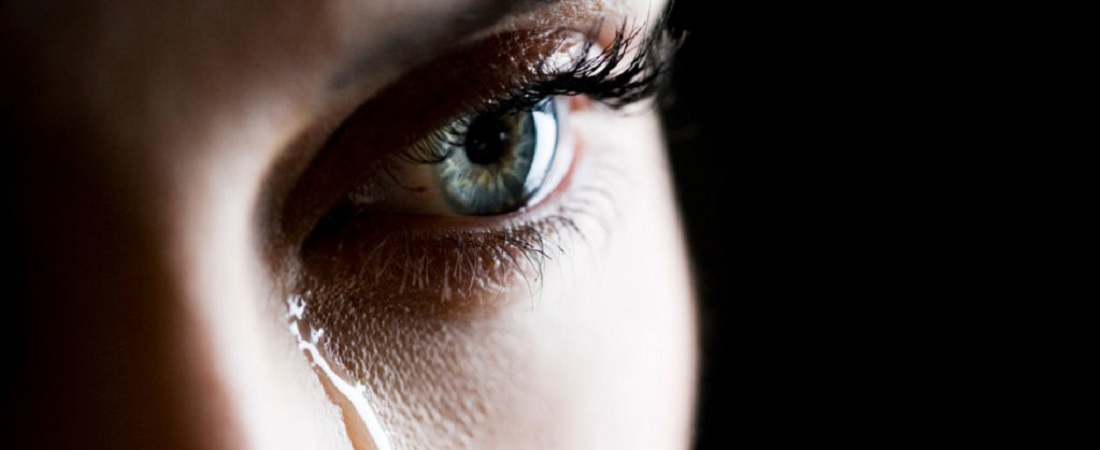
If you have eye problems, you can ask yourself questions such as:
- What is it in me, or is there anything that I do not want to look at?
- Do I have some deeply hidden worries or fears, memories or traumas which I am scared of bringing to light?
- Or do I have some worries concerning the current moment or the future that may blur my vision?
For example, cataract in older people may mean being afraid of the looming risk of becoming helpless, sick, and of being left alone, which they don’t want to see. Cataract symbolizes the lack of light in one’s life.
If you are more deeply interested which fears can cause loss of vision, cataract, conjunctivitis, glaucoma, short- and long-sightedness, and tear flow, you can buy D. Shapiro’s book Your Body Speaks Your Mind: Decoding the Emotional, Psychological, and Spiritual Messages That Underlie Illness. The book contains a lot of interesting topics (1).
Unfortunately, however, decrease in vision is not yet associated with internal or external factors. Losing one’s vision with age is simply thought as inevitable.
This is confirmed by statistics – cataract occurs in two thirds of people over the age of 50, but when crossing over the age of 60 years old, already 90% of people experience it. Glaucoma occurrence rate is 2% among people that are 40–50 years old and 8% in 70-year-olds. However, there are many old people whose eyesight is good and who have no problems with their eyes, and so arises the question of why some people experience a decrease in vision and others do not.
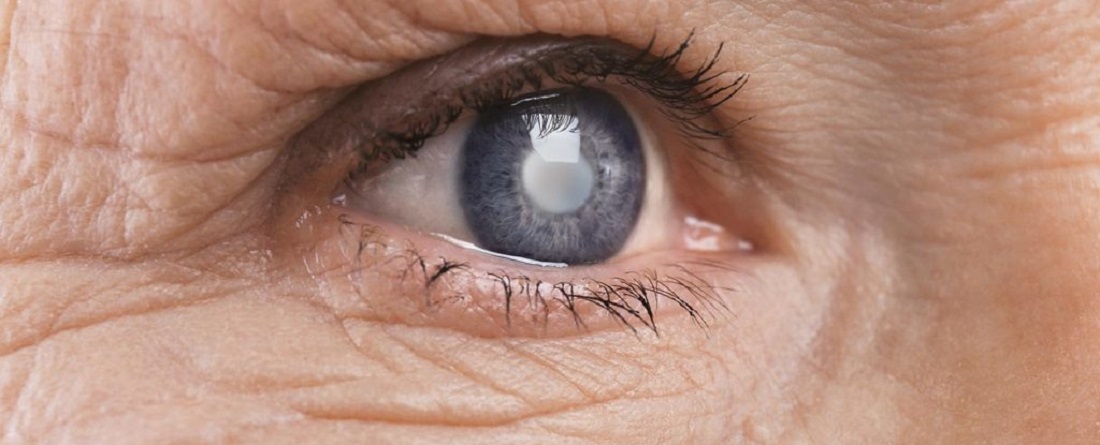
What is Cataract?
Cataract is explained as clouding of the lens in the eye which leads to a decline in vision and is frequent in older age. Cataract is less frequent in children, but it is one of the most common causes of blindness in children in developed countries. Precise causes and mechanisms of the development of cataract in adults are still not clear.
However, there is at least one doctor in the world who dared to oppose such an approach. Stanley Evans, the late British ophthalmologist, went to Africa in 1964 to study the causes of blindness and its prevention (4).
During the 17 years that he lived there, he carried out extensive research on the causes, prevention, and prophylaxis of blindness and other eye diseases.
Evans collected a series of unbelievable stories of people, who in Africa and the United Kingdom (and even in some other countries), managed to reduce or completely avoid vision problems thanks to eating right, exercising, and taking dietary supplements (4).
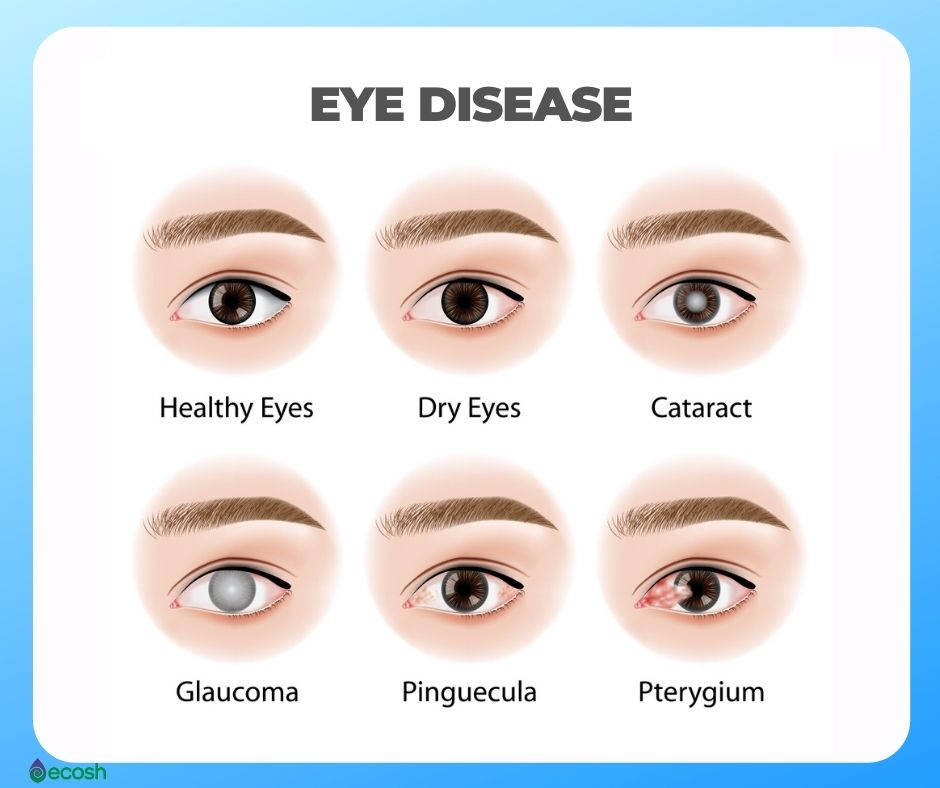
Evans found that many of the visual impairments were related to a particular nutrient that humans lacked, and then, after finding out which nutrients were affecting specific parts of the eye, he developed nutritional therapy. It has helped thousands of people with various types of eye diseases that had previously been thought to be incurable (4).
Newer studies also show that it might be possible to prevent cataract and glaucoma since their development and course is largely determined by our dietary habits, the nutritional values of our diet, and exposure to specific environmental toxins.
Extensive studies have shown that drugs such as cholesterol-lowering statins, steroidal and non-steroidal anti-inflammatory drugs such as aspirin, antidepressants, anticoagulants, antacids, antibiotics, as well as contraceptive pills also increase the risk of cataract and the risk of damage to the eye lens. In most cases, the cause of eye problems is still not known, nor can it be associated with drugs, unhealthy diets, psyche, or stress associated with fears.
However, despite the lack of links, our ophthalmologists do a great job, but people need to do the rest of the work for the health of their eyes by consuming versatile nutritious foods and by going over their internal sources of stress and their fears.
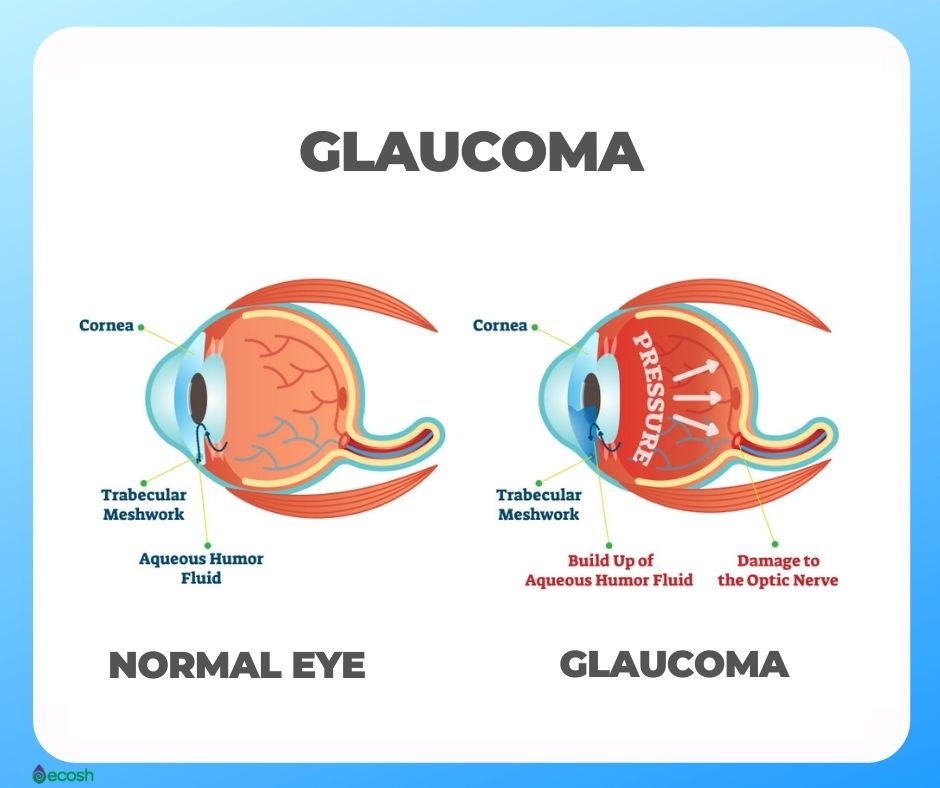
What is Glaucoma?
Glaucoma is an increase in intraocular pressure, which can lead to damage to the optic nerve and blindness. Intraocular pressure increases due to a disorder in the circulation of the intraocular fluid (fluid flows from the front to the back of the eye). The pressure exerts pressure on the various parts of the eye, which may cause damage to the optic nerve, and lead to vision declining.
Glaucoma is one of the most frequent reasons for blindness among people over 40. Traditional glaucoma treatments are drugs or surgery, which narrow pupils, prevent fluid secretion, facilitate its drainage and/or reduce intraocular pressure in the eye. Unfortunately, these treatments are eliminating the symptoms, not the causes.
Evans’s experience shows that, in many cases, glaucoma develops due to nutrients lacking. In particular, vitamin A deficiency causes the cornea to soften and for its texture to change from a pearlescent glass-like texture to pale and dull. In some cases, vitamin A deficiency may even lead to corneal erosion. Vitamin A is also destroyed by excess alcohol, medicines, and processed foods with a lot of sugars (4).
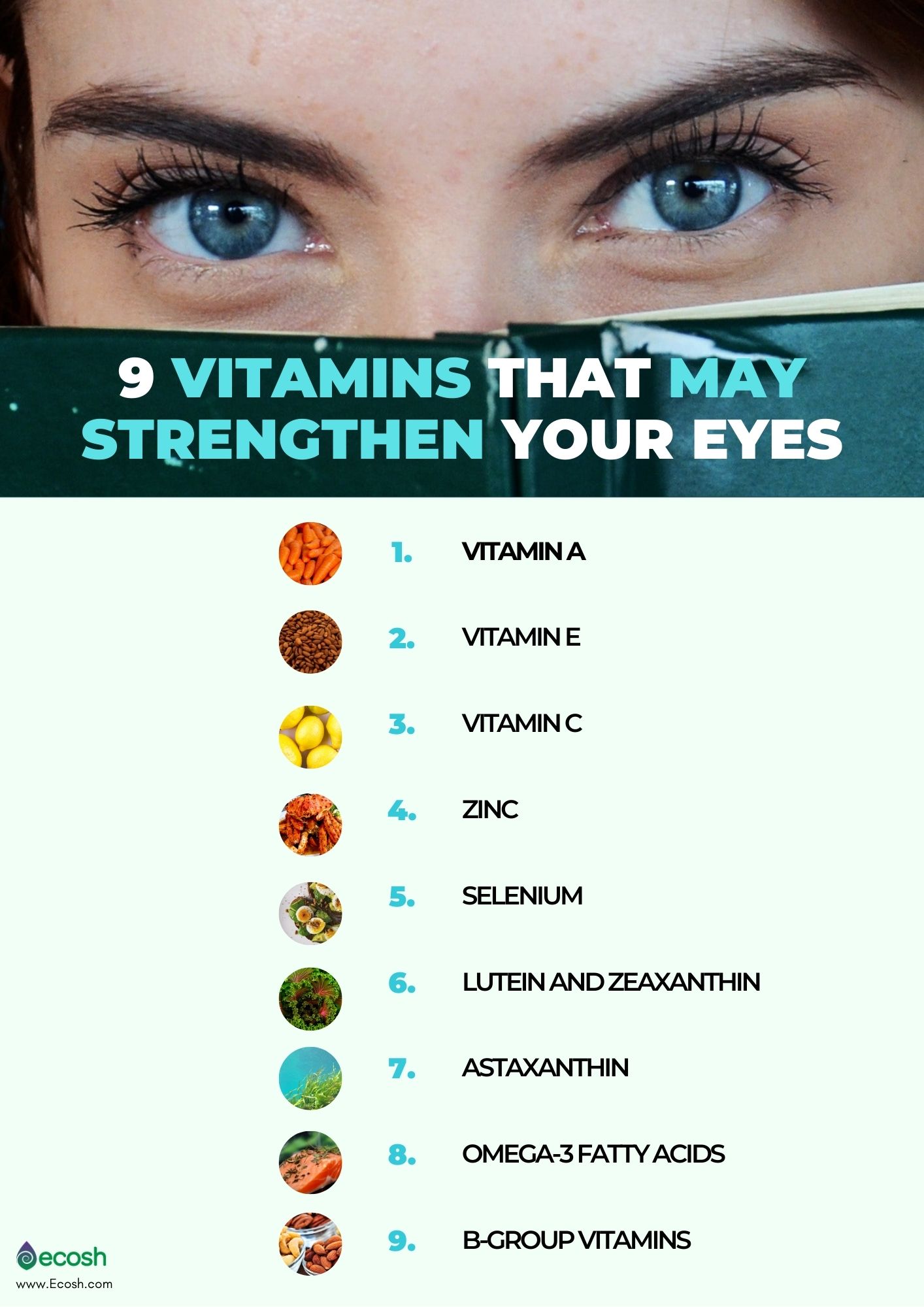
9 Vitamins That May Strengthen Your Eyes
1. Eye Health and Vitamin A
Vitamin A is an antioxidant that plays an important role in having a good vision. It keeps the mucous membrane moist and protects from bacteria, thereby reducing the risk of inflammation. Vitamin A helps eyes to adapt in the dark, prevents blindness due to macular degeneration and the formation of cataract.
Vitamin A deficiency can cause dry eyes and nyctalopia (night-blindness). This health condition makes it hard or impossible to see in low light. Every time we are in bright sunlight, in about a few seconds, almost all the photoreceptors called rods have their pigment bleached, and for us to be able to see again in the dark, it must first be restored. Vitamin A (retinol or carotene) helps to regenerate this pigment.
The daily recommended vitamin A intake is approximately 800 micrograms of retinol equivalent. People absorb vitamin A in the form of active retinol primarily from animal sources, such as liver and eggs. At the same time, the body can also convert beta-carotene from plant sources to retinol. Good sources of beta-carotene are yellow and orange fruits, vegetables, and berries.
2. Eye Health and Vitamin E
Vitamin E is an antioxidant that exists in many forms, but the human body best absorbs it as alpha-tocopherol. One of the symptoms of vitamin E deficiency is deterioration of vision. This vitamin is vital for the eyes:
- It slows deterioration of the macula
- Prevents the formation of cataract
- And strengthens the walls of capillaries
If there is enough vitamin E in the cell, its membrane works as a protective wall that prevents oxidation processes and reduces damage. In fact, even prevents damage to the photoreceptors. Vitamin E also reduces eye pressure, which is the main cause of glaucoma. Vitamins C and E appear to work synergistically and help prevent inflammation in the middle part of the retina (in the macula) that degrades due to age.
We get vitamin E mainly from plant-based foods, such as nuts and vegetable oils.
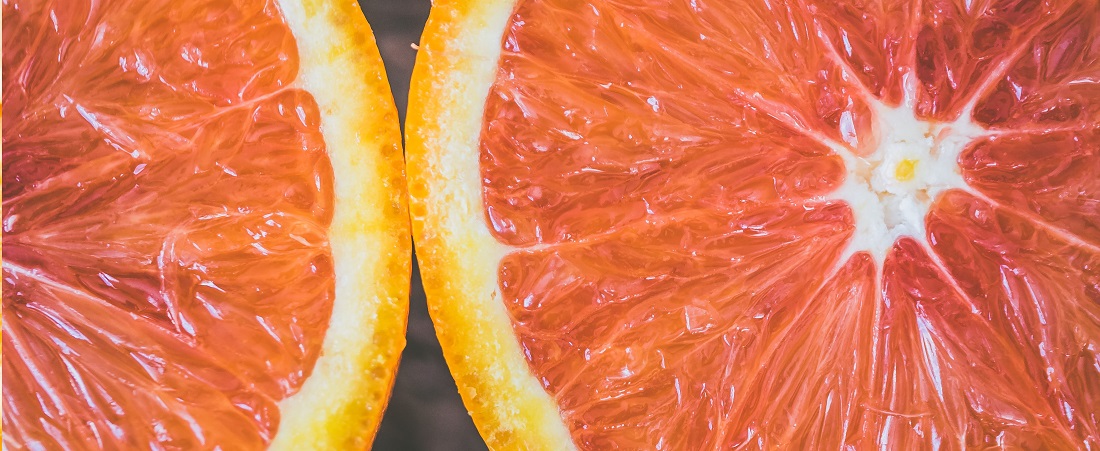
3. Eye Health and Vitamin C
Vitamin C (ascorbic acid), is a water-soluble vitamin and the main antioxidant present in many berries, fruits, and vegetables, such as citrus fruits, broccoli, turnip, bell peppers, etc. It is better to eat fresh fruits, because vitamin C is fairly sensitive to temperature, light, and oxygen.
Ascorbic acid supports the blood vessels in the eyes by protecting them from swelling, by ensuring their elasticity, and by preventing cataract formation. Vitamin C does not allow the free radicals that reach the cells in the eyes to damage the DNA in the nucleus of the cells, or the many metabolic pathways in the tissues surrounding the cells. Your body uses a lot of antioxidants in the eye to prevent light-induced oxidative damage. Vitamin C concentration in the eye is 20 times higher than in the blood.
This means that, to see real effects, especially when we have already noticed the first signs of eye diseases, vitamin C and other antioxidants must be taken in significant quantities. The need increases with illnesses, and is higher for smokers, pregnant women, and nursing mothers. However, consult your doctor before starting to self medicate and taking any dietary supplements.

4. Eye Health and Zinc
There is a large amount of zinc in the retina of the eye. Therefore, zinc may have an important role to play in the health of the eye. Zinc is a mineral that helps absorb vitamin A. Also, it creates the pigment melanin, which protects the eye from ultraviolet rays. Zinc is an important factor in the functioning of the immune system and in antioxidant defence.
In addition, zinc helps to improve vision in the dark and prevents macular degeneration. In the event of a severe deficiency, lack of zinc may also cause changes in the retina of the eye. You can find zinc for example in liver, nuts, whole grain products, and seafood or buy zinc supplements online. However, consult your doctor before starting to self medicate and taking any dietary supplements.
The daily recommended dose is 9 mg. Plant-based food sources inhibit the absorption of zinc, so vegetarians should increase the zinc intake about 30%.
5. Eye Health and Selenium
Selenium is an antioxidant that helps better absorb vitamin E. It also promotes the development of capillaries and supports blood circulation, including in the eyes. Selenium helps reduce the development of cataract. Good sources of selenium are fatty fish, shellfish, eggs, pork, beef, turkey, chicken, liver, nuts, and seeds.
With a normal diet, a person can easily receive the daily recommended dose of 60 micrograms.
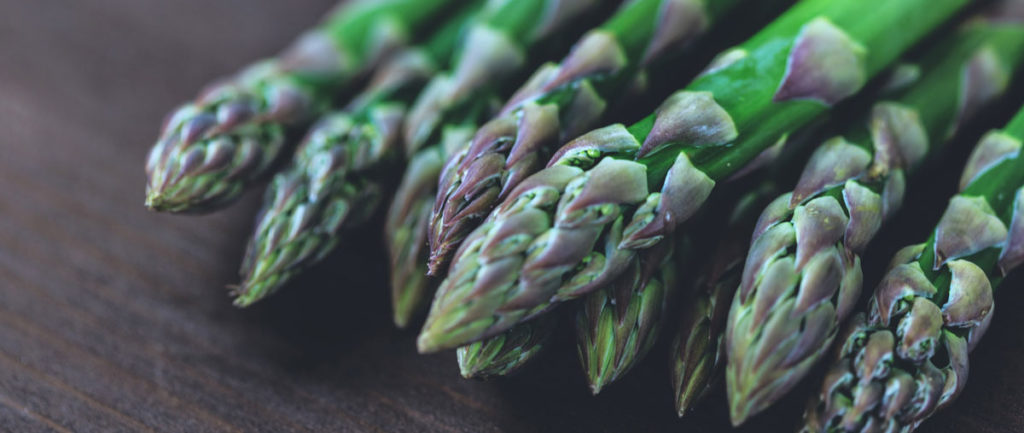
6. Eye Health – Lutein and Zeaxanthin
In the human eye, there are two kinds of carotenoids – lutein and zeaxanthin. These are yellow pigments that give macula its color. Lutein and zeaxanthin act as natural sunglasses. They protect the eyes from harmful ultraviolet rays and slow down the destruction of macula. These carotenoids help maintain good vision, especially in low light conditions. Lutein and zeaxanthin are antioxidants that neutralize free radicals released by light exposure, which can damage the retina of the eye.
The elderly, smokers, menopausal women, and blue-eyed people have less of the protective pigment melanin in their eyes, so they may need more lutein.
All carotenoid-containing products with antioxidant properties, such as:
- Green vegetables
- Blueberries
- Spinach
- Cabbage and savoy cabbage are good for the eyes because they contain lutein – the king of the carotenoids.
- Egg yolk
- Kiwi
- Grapes
- Corn
- Blue and crimson berries, such as blueberries, blackberries, purple and red grapes contain anthocyanins that support the ability to see in the dark.
Lutein and zeaxanthin do not have specific RDA figures (recommended dietary allowance). However, researchers advise consuming 6–20 mg of lutein per day. The amount of zeaxanthin should be 1/5 of lutein intake. Several studies have shown that the regular consumption of such quantities of lutein and zeaxanthin may reduce the risk of age-related macular degeneration.

7. Eye Health and Astaxanthin
The green algae Haematococcus pluvialis produces a type of carotenoid Astaxanthin under sunlight. Sea birds and animals actually derive their pink color from eating this algae that contains pink pigments. Studies have shown that astaxanthin has many times more antioxidant power than vitamins E and C, lutein, and beta-carotene.
Astaxanthin works well with other antioxidants, such as vitamins C and E, as it enhances their effect.
It is one of the few antioxidants that can pass both the brain-blood barrier of the central nervous system and the blood-retinal barrier of the eyes. Therefore, it helps to prevent oxidative stress and neurodegenerative damage in these areas (6, 7). Astaxanthin protects eyes from damages caused by inflammation and light and helps reduce eye fatigue and dryness. This is great news for those who work on a computer every day.
Algae, and red seafood, such as crabs, lobsters, prawns, and salmon contain large amounts of astaxanthin. Even a small amount of this antioxidant (4–6 mg per day) improves visual acuity.
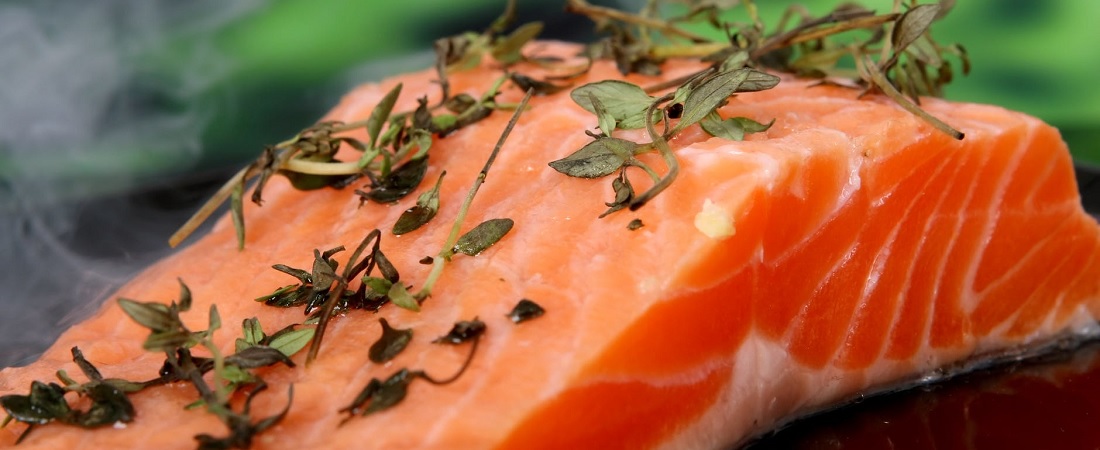
8. Eye Health and Omega-3 Fatty Acids
Two essential fatty acids, omega-3 fatty acids called docosahexaenoic acid (DHA) and eicosapentaenoic acid (EPA) play an important role in the development and preservation of vision. The retina of the eye contains a high amount of DHA, which indicates its importance in the metabolism of the eye. EPA plays an important role in the synthesis of DHA.
Both fatty acids are very important for the development of vision in fetuses and infants. In adults they help protect the retina of the eye. These fatty acids help keep visual acuity.
Omega-3 fatty acid deficiency is associated with the dry eye syndrome. EPA and DHA help ensure that enough oil is present in the tear film that moisturises the eye. Lack of omega-3 fatty acids is also linked with other ocular diseases such as macular degeneration and glaucoma. Omega-3 fatty acids that are important for health are mainly found in fish, whereas omega-6 fatty acids are found in nuts and vegetable oils.
You can buy Omega-3 dietary supplements online. However, talk to your doctor before starting to self medicate and taking any dietary supplements.
There is no agreement on the daily dose of DHA and EPA. However, their relationship should be 1:1 and should account for about 3% of an adult’s caloric intake.
9. Eye Health and B-group Vitamins
In case of eye diseases, eyes need B-group vitamins, such as B1, B2, B6, B9, and B12 in large quantities, but often at lower doses for individuals with glaucoma.
Mediterranean cuisine, and fresh, ecologically grown produce, such as:
- Fruits and vegetables
- Olive oil
- Poultry, meat and liver
- And legumes help to effectively improve eye health. Read more about the B-group vitamins role in your body and about foods rich in B-group vitamins. You can buy the B-group vitamin complex online. However, consult your doctor before starting to self medicate and taking any dietary supplements.
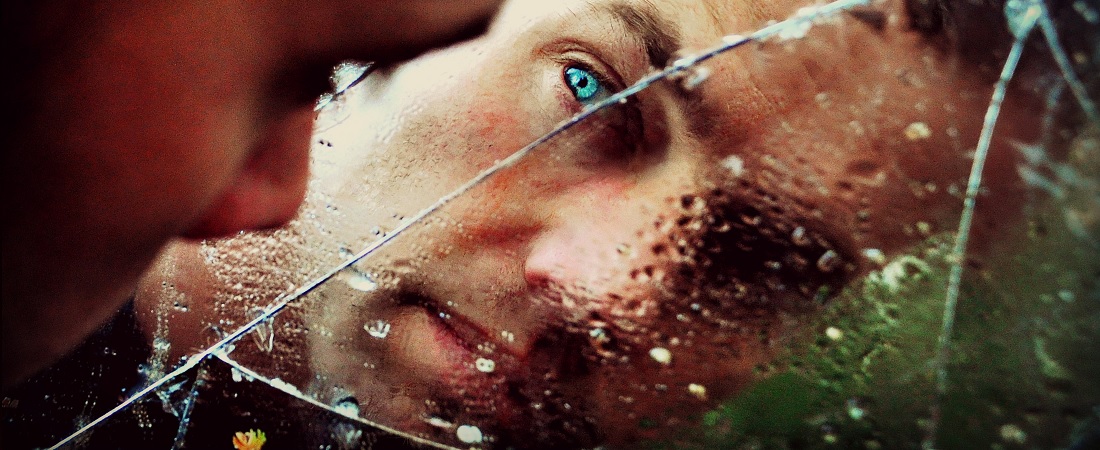
NB! In Summary, The Main Causes of Eye Diseases Are:
- Inadequate nutrition – food that is low in nutrients
- Stress – heavy and long-term negative emotions
- Oxidative stress – environmental toxins, such as cigarette smoke and alcohol, pesticides and medicines
- Light – excessive UV radiation and other radiation
- Several diseases – such as diabetes, malfunctioning of the thyroid gland, and eye infections and injuries
NB! The information provided here is for informational purposes only, so do not consider it as health care or medical diagnosis and treatment. Do not consider this information as a guarantee of the results you want to achieve. In addition, this information does not replace the advice of your physician or other healthcare professional.
Even more, you should not use it to diagnose or treat a health problem. Before changing or discontinuing your existing medication, treatment, or care, or taking any dietary supplements, be sure to consult with your healthcare professional or doctor before starting any diet or program, or if you suspect you may have a medical condition.
Sources:
- D. Shapiro Your Body Speaks Your Mind: Decoding the Emotional, Psychological, and Spiritual Messages That Underlie Illness.
- Magazine What Doctors Don’t Tell You, June 2018 No. 6 (42). What to eat, so that vision wouldn’t be impaired in old age.
- Mihkelsoo, L., Mihkelsoo, V. Step-by-Step Self-Healing Guide
- https://books.google.ee/books/about/Nutrition_in_Eye_Health_and_Disease.html?id=6lisAAAAIAAJ&redir_esc=y
- Wiki
- https://www.ncbi.nlm.nih.gov/pmc/articles/PMC6878783/
- https://drdavidbrady.com/astaxanthin/#:~:text=Astaxanthin%20is%20a%20particularly%20powerful,most%20powerful%20in%20its%20class.
Pictures: Pexels.com, Pixabay.com, Shutterstock.com

